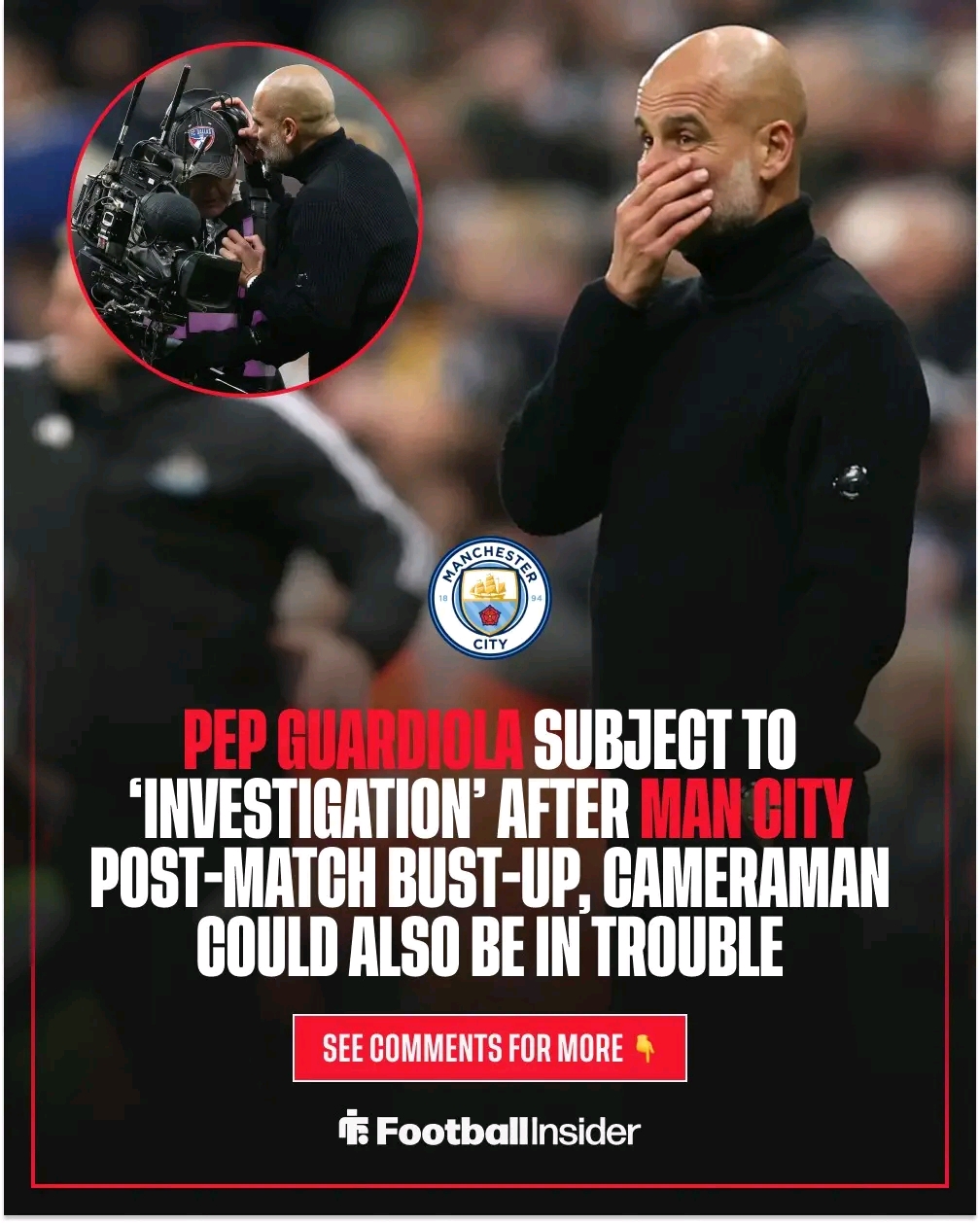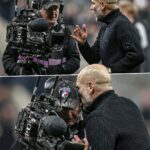Pep Guardiola subject to ‘investigation’ after Man City post-match bust-up, cameraman could also be in trouble

Everyone expected emotions after Manchester City lost 2-1 to Newcastle United at St James’ Park, but nobody expected the scenes that unfolded after the final whistle, scenes that sent shockwaves across the football world and left everyone talking not about goals, not about tactics, not about title race pressure, but about Pep Guardiola walking off the pitch with rage in his eyes and frustration in his heart. The defeat was painful enough, but the moment when the City manager appeared to grab and confront a cameraman turned the atmosphere from disappointment into controversy, and suddenly the headlines became louder than the match itself. People who love football already know that Pep is a genius, a master, one of the greatest to ever stand in the dugout, but they also know he is human, and that night his emotions escaped, not quietly, not silently, but in full public view.
It was not just a small misunderstanding. It was not something that could be ignored. The cameras caught it. The world saw it. The clip spread like wildfire across social media within minutes, and fans across the world kept replaying it again and again, trying to understand what happened. Was the cameraman too close? Was Pep provoked? Was it frustration from the match? Was it pressure from the title race boiling over? Opinions flooded everywhere. Some said he should have ignored the cameraman. Some said the cameraman had no business blocking his path. Some blamed stress. Some blamed the Premier League schedule. Some blamed the whole media culture that always wants to put cameras right in the faces of managers during their worst moments.
According to former PGMOL chief and ex-FIFA referee Keith Hackett, the incident cannot just be ignored the way passionate fans wanted. Hackett explained that the authorities would request Guardiola’s observations about what happened, meaning they want his version, his explanation, his side of the story. In simple words, Pep is under investigation, and the cameraman might be under investigation as well. Just like the match itself, this situation has two sides, two possible interpretations, two possible outcomes. It is now a question of who crossed the line, and how the football authorities decide to respond. Hackett made it clear that they need to determine what caused the confrontation. Was the cameraman being overindulgent? Was he blocking Guardiola’s exit from the pitch? Was he trying to get footage for dramatic storylines? Was Pep reacting emotionally because of the defeat? These are now questions that the authorities will study because football, especially Premier League football, does not allow scenes involving physical contact with broadcasters to go unnoticed.
The match itself was full of hurt for Manchester City. Harvey Barnes reminded everyone that football gives chances to heroes and villains depending on the night. He missed a brilliant chance in the first half, then later scored twice with the sharpness of a striker who smelled weakness and refused to forgive. Ruben Dias equalised to give City hope, but it was not enough. It was not enough because finishing was not sharp enough. It was not enough because the midfield did not control the tempo. It was not enough because Newcastle fought harder in certain moments. It was not enough because football sometimes rewards the team that is hungrier, regardless of possession. City wanted to close the gap on Arsenal, but instead the gap stayed open, and maybe even widened in the minds of anxious fans.
But while the result itself brought pain, what came after brought tension. The image of Guardiola marching off the pitch with his emotions boiling over became the most discussed moment of the night. It was a moment that exposed the pressure he carries, the expectations he faces, the weight of every season. Fans often forget that even managers suffer. They smile on the outside, but inside they absorb every defeat like a wound. Pep wanted to win. He wanted to keep momentum. He wanted to silence doubters. He wanted to drag City closer to Arsenal. Instead, he left the pitch with a thousand cameras looking at him, and one camera got too close.
Even before the incident, Manchester City already felt wronged by several decisions during the match. Many supporters believed they should have had a penalty when Fabian Schär made contact with Phil Foden inside the penalty area. Wayne Rooney said it clearly — it was a clear penalty in his opinion, one that could have changed the match completely. Decisions like that can change the story of a night, the emotions of a fanbase, the weight on a manager’s shoulders. And in football, when disappointment stacks on top of frustration, and frustration stacks on top of pressure, one single spark can cause an explosion.
To add even more anger to the mix, Gianluigi Donnarumma was furious after Newcastle’s winning goal, protesting to the referee, saying he was fouled before Barnes scored from close range. But like many protests in football, once the referee pointed to the centre circle, the anger became irrelevant. The goal stood. The stadium erupted. And City were forced to swallow the bitterness of defeat.
That sense of injustice did not disappear after the whistle. It followed Pep Guardiola as he walked across the pitch, and then one thing happened that flipped the story from sporting disappointment to disciplinary attention. Cameras always try to capture emotion, drama, heartbreak, joy, anger, tears — because football is not only a game, it is theatre. But theatre becomes dangerous when emotions and physical movement collide. When the cameraman got close to Pep, nobody knows what words were exchanged, but the images show Pep appearing to push or grab the camera as though trying to move the cameraman out of his way. Some people believe Pep felt he was being disrespected in his lowest moment. Some believe he simply lost control. Others believe the cameraman was doing his job too aggressively. Until the investigation is completed, nobody can say with certainty.
Now, the situation becomes deeper than just football. If the Premier League and FA decide that Pep behaved aggressively towards a media worker, punishment is possible. If they decide the cameraman violated protocol, then he could face consequences too. It is no longer about who won the match. It is about professionalism, conduct, rules, responsibility, boundaries, and expectations. This is the type of story that brings endless debate — not because people want trouble, but because football lives from emotions, and the biggest personalities always attract the brightest spotlight.
Some Manchester City fans are defending Pep. They say he was targeted. They say media people always push too far to get dramatic images. They say after 90 intense minutes of pressure, a manager deserves space. They say nobody should point a lens in his face one second after heartbreak. They say the cameraman should have known better. Other fans disagree. They say Pep must stay calm no matter the situation. They say managers must act with composure even in humiliation. They say cameras are part of football now, and contact with them must never happen.
And Pep himself? He has not spoken publicly about the incident yet, and that silence only adds more tension. When he sits down in front of reporters next, his body language will be studied, his tone will be analysed, his every sentence will become a headline. Because when the biggest manager in football does something controversial, the world does not forget quickly.
Meanwhile the squad prepares for their next challenge, and the weight of both defeat and controversy sits heavy. The focus should be on the Champions League match against Bayer Leverkusen, but instead questions are circling around disciplinary issues and media confrontation. Some players will try to ignore it. Some will pretend not to know what is happening. But everyone does. You cannot escape drama in modern football. The story always finds you.
Manchester City still have the quality to compete for every trophy, but nights like this remind everyone that success does not protect you from chaos. Every defeat is an earthquake. Every mistake is a headline. Every emotional reaction becomes controversy. Pep Guardiola has won everything and built one of the greatest football dynasties in history, but he is still a man dealing with pressure. A man dealing with expectations. A man dealing with eyes watching him every second of his job. Managers talk about tactics, but they live with emotions.
Newcastle fans celebrated. Manchester City fans argued. Pundits discussed. Social media erupted. And now the authorities will take over. Pep must explain himself. The cameraman must explain himself. Soon we will discover whether this story fades or explodes, whether this moment becomes a footnote or a turning point.
Football does not rest. There is no time to hide. Manchester City return to the pitch soon, and everything — the title race, the Champions League dream, the bounce-back reaction — depends on how this defeat and this controversy are handled. Some say Pep will return stronger than ever. Some say the pressure is starting to crack the surface. All we know for now is that football has written another dramatic chapter, and the next page could be even louder















